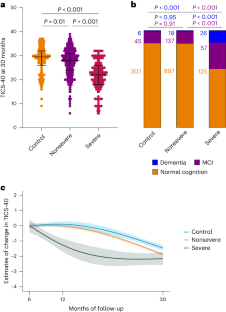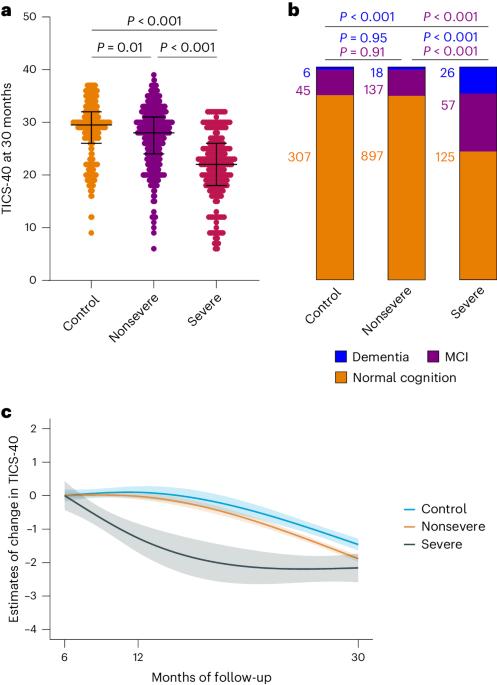Tracking cognitive trajectories in older survivors of COVID-19 up to 2.5 years post-infection
IF 17
Q1 CELL BIOLOGY
引用次数: 0
Abstract
Emerging evidence suggests that neurological and other post-acute sequelae of COVID-19 can persist beyond or develop following SARS-CoV-2 infection. However, the long-term trajectories of cognitive change after a COVID-19 infection remain unclear. Here we investigated cognitive changes over a period of 2.5 years among 1,245 individuals aged 60 years or older who survived infection with the original SARS-CoV-2 strain in Wuhan, China, and 358 uninfected spouses. We show that the overall incidence of cognitive impairment among older COVID-19 survivors was 19.1% at 2.5 years after infection and hospitalization, evaluated using the Telephone Interview for Cognitive Status-40. Cognitive decline primarily manifested in individuals with severe COVID-19 during the initial year of infection, after which the rate of decline decelerated. Severe COVID-19, cognitive impairment at 6 months and hypertension were associated with long-term cognitive decline. These findings reveal the long-term cognitive trajectory of the disease and underscore the importance of post-infection cognitive care for COVID-19 survivors. Tracking cognitive function over 2.5 years following SARS-CoV-2 infection, Liu, Wu, Wang et al. find that cognitive decline in older COVID-19 survivors in Wuhan, China, manifests primarily in the first year following severe COVID-19.


追踪 COVID-19 老年幸存者感染后 2.5 年的认知轨迹
新的证据表明,感染 SARS-CoV-2 后,COVID-19 的神经系统和其他急性后遗症可能会持续存在或发展。然而,COVID-19 感染后认知变化的长期轨迹仍不清楚。在此,我们对在中国武汉感染 SARS-CoV-2 原始毒株后存活下来的 1,245 名 60 岁或以上的患者以及 358 名未受感染的配偶进行了为期 2.5 年的认知变化调查。我们通过认知状况电话访谈-40(Telephone Interview for Cognitive Status-40)评估发现,COVID-19 老年幸存者在感染和住院 2.5 年后认知障碍的总体发生率为 19.1%。认知功能下降主要表现在感染后最初一年的严重 COVID-19 患者身上,此后下降速度减慢。严重的 COVID-19、6 个月时的认知障碍和高血压与长期认知能力下降有关。这些发现揭示了该疾病的长期认知轨迹,并强调了对COVID-19幸存者进行感染后认知护理的重要性。
本文章由计算机程序翻译,如有差异,请以英文原文为准。
求助全文
约1分钟内获得全文
求助全文
文献相关原料
| 公司名称 | 产品信息 | 采购帮参考价格 |
|---|

 求助内容:
求助内容: 应助结果提醒方式:
应助结果提醒方式:


